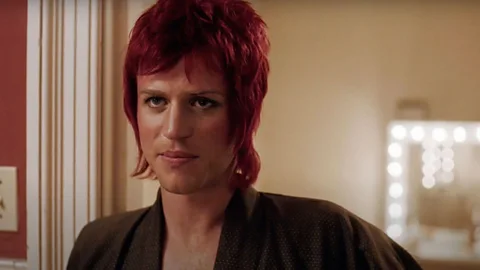Why biopics go so wrong
 Alamy
AlamyStardust, a new movie about a young David Bowie, has been widely mocked. It’s just the latest example of a real-life icon making for a disastrous film subject, writes Nicholas Barber.
Released in 2018, the hit Freddie Mercury biopic Bohemian Rhapsody had its producers singing We Are the Champions: it won four Oscars and took close to $1bn at the box office. The following year, Rocketman, a musical based on the life of Elton John, did well, too, making enough money to keep Sir Elton in designer specs for decades, and nabbing two Oscars of its own. And now Stardust, featuring Johnny Flynn as a young David Bowie, thus completing a trilogy of dramas about exotically stage-named, sexually adventurous British glam-rock legends. The film is released in the UK today, so presumably its producers are just waiting for the trophies and the profits to roll in.
Or maybe not. There is no doubting the sincerity of its Bowie-phile cast and crew, but unlike Bohemian Rhapsody and Rocketman, Stardust is a low-budget indie movie with some unavoidable flaws. The director made the curious decision to cast actors in their thirties, forties and even fifties as people who were in their twenties at the time. And because Stardust wasn't approved by the late singer's estate, it has to do without any of his songs.
 Alamy
AlamyUnsurprisingly, the trailer was mocked on social media when it was unveiled in October, and, when the film came out in the US in November, the AV Club's critic dismissed it as ''a junky biographical drama that doesn't feature any music by Bowie or his contemporaries and stars a guy who doesn't look or sound anything like the man''. That was one of the more enthusiastic reviews.
The risks involved
The lesson is that the celebrity biopic is the most high-risk of genres. When it goes well, it fills cinemas and wins awards, especially in the 21st Century. But when it goes badly, a biopic can be terrible in its own special, excruciating way.
Actors clearly believe that it's worth the gamble – and understandably so. Since 2000, 11 of the Oscars for best actor have gone to famous people playing other famous people: think of Jamie Foxx in Ray, Philip Seymour Hoffman in Capote, Daniel Day-Lewis in Lincoln, Eddie Redmayne in The Theory of Everything, Gary Oldman in The Darkest Hour and, of course, Rami Malek in Bohemian Rhapsody. In the same 20 years, 10 of the best actress Oscars have also been for performances in dramas which revolve around real lives, including Charlize Theron in Monster, Reese Witherspoon in Walk the Line, Helen Mirren in The Queen, Meryl Streep in The Iron Lady and, last year, Renée Zellweger in Judy.
But not everyone has been so lucky. Gotti (2018), starring John Travolta as mob boss John Gotti, is one of the few films to have scored 0 per cent on Rotten Tomatoes. "I'd rather wake up next to a severed horse head than ever watch Gotti again," wrote Johnny Oleksinski in the New York Post. Kevin Spacey's biopic of singer Bobby Darin, Beyond the Sea (2004), didn't go down much better. The film, which cost $25m to make and took only a third of that amount in ticket sales, was co-written and directed by Spacey, who also crooned the songs and starred as Darin, even though the actor was then in his mid-40s, and the singer died aged 37. Mick LaSalle at the San Francisco Chronicle called it "a misbegotten and ill-conceived vanity project... [and] one of the most embarrassing spectacles of 2004".
To appreciate what a risky business the modern biopic can be, you have only to look at four examples from two directors. Oliver Hirschbiegel made Downfall (2004) about the last days of Adolf Hitler, and although a clip of the Führer's bunker rant is often jokily re-subtitled on YouTube, the film stands as one of the most acclaimed of all cinematic depictions of the Nazi regime. You might assume, then, that when Hirschbiegel went on to make another drama about a 20th-Century icon, it would have to be decent, at least. But Diana (2013), starring Naomi Watts as a lovestruck Princess Diana, was so silly in so many ways that The Daily Telegraph published an article by Tim Robey entitled "The 10 most risible moments in Diana". The only trouble, wrote Robey, was that the film was "so chock-full of wacky, tonally bizarre and unintentional-LOL moments that choosing just 10 is a serious challenge".
 Alamy
AlamySimilarly, Olivier Dahan directed a biopic of Edith Piaf, La Vie en Rose (2007), and Marion Cotillard became the first ever actress to win an Oscar for a performance in a non-English language. But Dahan's next biopic was Grace of Monaco (2014), starring Watts' friend Nicole Kidman as Grace Kelly. The film, wrote Peter Bradshaw in The Guardian, was "awe-inspiringly wooden [and] fantastically boring... like a 104-minute Chanel ad, only without the subtlety and depth".
How could two filmmakers plummet from such glittering heights to such murky depths? "It’s nuts, isn’t it," Robey tells BBC Culture. "I think the dividing line between quality and camp is perilously thin in the biopic. Something about the high seriousness of the genre seems to invite mockery. And then when the directors aren't in charge of the mockery themselves, they can let things go truly haywire."
This "high seriousness" is one of the main reasons why some biopics are loved – and why others are laughed at. "Biopics have always been seen as a prestige picture, not something run of the mill," says Yannis Tzioumakis, the author of American Independent Cinema: An Introduction. "If you look back to the Hollywood studio era of the 1930s and 1940s, it's full of them, because a biopic was thought of as being better than a western or a musical. It was inviting audiences to see history."
Why Hollywood is obsessed
Unlike a western or a musical, says Robey, a biopic has "a kind of all-boxes-ticked appeal": "You have a true story. You have historical context, a backdrop lending grandeur or importance. You have the arc of a life that's great or significant in some way." People who go to the cinema only once or twice a year may feel that such greatness and significance merits their valuable time more than the cheap thrills of a Gerard Butler action movie. But when a film is over-inflated by its own sense of grandeur and importance, it's like a balloon which is all too liable to pop. One misjudgement, and the whole enterprise deflates.
In Clint Eastwood's biopic of the FBI's founder, J Edgar (2011), the pin that burst the balloon was the old-age make-up which turned Armie Hammer (playing J Edgar Hoover’s right-hand man Clyde Tolson) into a newly unearthed Egyptian mummy. In Pollock (2002), Ed Harris's biopic of Jackson Pollock, it was the on-the-nose line delivered by Marcia Gay Harden as Lee Krasner when the artist completed his first action painting: "You've done it, Pollock. You've cracked it wide open." And in Darkest Hour (2017), it was the notorious scene in which Winston Churchill (Gary Oldman) is cheered up by an underground train carriage full of adoring, poetry-quoting Londoners. "That was when the film jumped the shark," says Ellen Cheshire, the author of Bio-Pics: A Life In Pictures. "It was so heavy-handed that you watched it and thought, 'Oh my God, what are they doing":[]}
